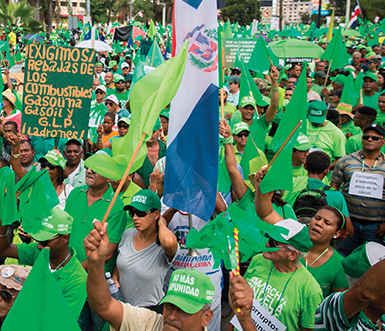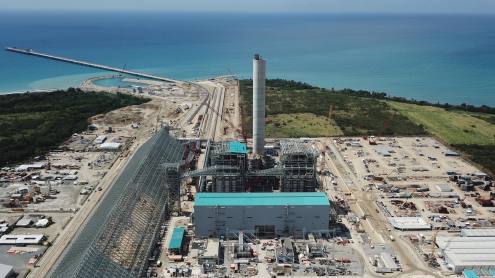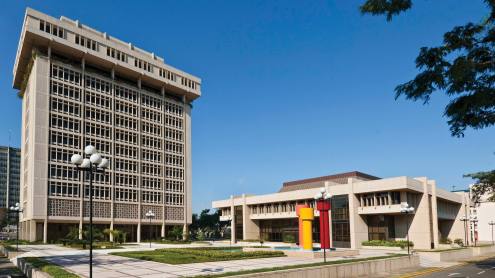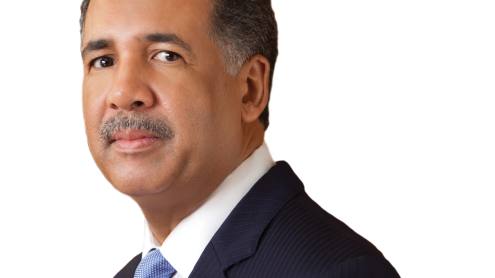In September, the Finance Action Task Force of Latin America, known as Gafilat, reported that the Dominican Republic was in line with international anti-money laundering standards, in the first major review since new legislation was fully enacted by executive decree in the country a year ago.
President Danilo Medina’s overhaul of earlier legislation from 2002 beefed up laws and brought under supervision a wider array of sectors. The Anti-money Laundering and Terrorist Financing Act (AML/CFT) expanded the definition of money laundering to a number of crimes including copyright violation, counterfeiting and, most importantly, tax evasion and avoidance.
“Generally speaking, the Dominican Republic has updated its AML/CFT regulatory framework, which is largely in line with international standards,” the Gafilat report said.
Filling in the gaps
The Dominican government has since adopted other international procedures, including the early October adherence to the Base Erosion and Profit Shifting project to fight tax avoidance, spearheaded by the Organisation for Economic Co-operation and Development.
“Laws for financial crimes have been around for a long time, but what you see now are regulations to fill gaps, to reduce risks. I would say that the regulations will continue to get stricter as the country complies with international standards,” says Tod Burwell, president and CEO of the US-based Bankers Association for Finance and Trade.
Tougher standards are the only way a country such as the Dominican Republic can maintain its solid financial system and guarantee paths for obtaining resources from external sources – critical to the economy. “The Dominican Republic is highly dependent on external financing,” says Manuel Orozco, a sovereign analyst at S&P Global who covers the country.
Tax collection – and evasion
One of the bigger problems for the Dominican Republic’s long-term growth has been tax collection or, rather, its failure to collect taxes. In a 2017 report, ‘Gearing up for a more efficient tax system’, the World Bank said tax revenue had not kept pace with robust economic growth, and tax collection had averaged about 14%, which is below average for the Latin American and Caribbean region.
“Despite the government’s efforts, by 2016 total revenues had reached just 14.6% of gross domestic product [GDP] – well below both the Dominican Republic’s 2007 peak of 16.6% and the rates of several regional comparator countries with lower per-capita GDP,” the report said. It also said the country has a serious problem with its value-added tax (VAT) collection. VAT evasion, fraud and mismanagement are “among the highest in the region at an average” according to the report, with the country only doing better than Guatemala and Mexico among its central American peers.
The new legislation is a step towards clamping down on rampant tax evasion, according to Alfredo Guzmán, of law firm Guzmán Ariza. “The AML law criminalises tax evasion. This is a major change, because before it was a civil or administrative issue and not really seen as a crime,” says Mr Guzmán. “The Dominican Republic, however, is still in its infancy when it comes to income transparency and taxes.”
The government did give high earners a bit of wiggle room, with the money laundering rule applied only when the amount of the offence is greater than 700 times the minimum wage ($137,000 under the current rate).
The new rules also establish the figure of beneficial ownership, which gives the state the opportunity to establish the final owner or owners of a business or asset. It is a move being instituted throughout Latin America – Peru recently followed suit in August. Tax filings need to name as the beneficial owner anyone with more than 20% of an asset. If the owner cannot be established, the legal representative on the filing is considered the beneficiary.
A check on corruption
Another change in the Dominican Republic's tax laws is the definition of 'politically exposed person' – a concept that has also taken root in legislation throughout the region. It has gained prominence in countries such as the Dominican Republic because of the region-wide scandal that grew out of Brazil’s Lava Jato (Car Wash) corruption investigation.
The primary player in the scandal was Brazilian builder Odebrecht, which admitted in a US court case in late 2016 that it had paid nearly $800m in bribes in several countries in order to win public works contracts. It allegedly paid $92m in bribes in the Dominican Republic.
The Medina government arrested more than 10 people in 2017 and pledged a thorough investigation, but the scandal has spawned a mass civil society movement. A "green march" protesting against corruption was held in the Dominican Republic in January 2017, shortly after the scandal erupted. The latest version in August brought tens of thousands of Dominicans onto the streets of the capital in the largest march in the country’s history, and was also seen in US cities with large Dominican populations.
Organisers are intent on keeping up the pressure, saying in a statement prior to the August march that they were “committed to changing structures in order to, once and for all, remove criminal politicians from all public spaces, because criminals belong in jail, not in the state”.
The widening of the definition of 'politically exposed person' may help on this score. It applies not only to people in public positions, but extends to a wider circle – so it could include, for example, the relatives of a top authority figure (such as a government minister) in order to eliminate graft.
The Gafilat review presented in September stressed that fighting graft was a key point in the Dominican Republic that requires continued action. “Among the most problematic factors to carry out businesses in the Dominican Republic, corruption is in the lead,” it said.
A wider reach
While the legislation includes provisions for top income earners and public officials, it also has implications for regular citizens, and many of these may not be immediately noticeable. For government authorities, common aspects of everyday life such as car dealerships, construction companies or casinos are prime targets for drug traffickers and other criminal networks to launder money.
The legislation extends to these sectors, and a long list of others, from law firms to pawn brokers, which are now required to have compliance officers, file monthly reports and have a much closer relationship with sector authorities.
Adapting internal procedures and systems to ensure compliance can be a challenge. Not only do they have to maintain transaction registries, they also must evaluate and report money laundering and terrorist financing risk, and perform due diligence, which has three levels of definition (regular, simplified and enhanced) depending on the transaction. Previously this was something carried out only by large entities such as commercial banks. The sectors included are not only required to comply, but can be held accountable if something is missed – risking huge fines and even jail time for egregious cases.
Risk reduction
The Dominican Republic’s full-service banks have been working through their own compliance norms for years, but the Gafilat report sees risk in related sectors, such as the large savings, loans and co-operative sector, insurance brokers and remittance businesses.
While remittances on average are not large transactions, averaging about $213 per transaction in the country, taken together they are a huge component of the Dominican economy, equivalent to more than 7% of GDP. Total remittances increased from $3.7bn in 2010 to $5.7bn in 2017. The new legislation means that the average Dominican will not be able to use cash for big purchases. This includes cars and jewellery, as well as other property (real estate transactions above $28,000 require non-cash payments, for example).
It also applies if citizens want to hawk something of value at a pawn shop, or try their luck at a casino or a sports betting venue. The state wants to know how money is earned and spent to control laundering – and, hopefully, cut down on corruption and increase its tax haul. “The new rules have had an impact on all non-financial sectors because of the tax evasion component. Many things have changed – and will continue to change,” says Mr Guzmán.












